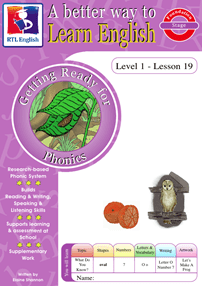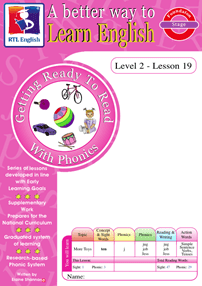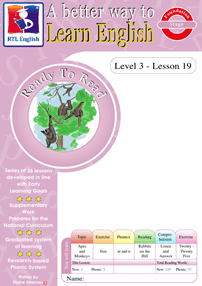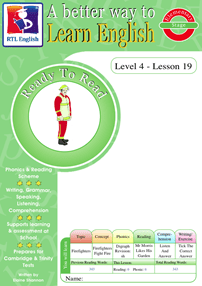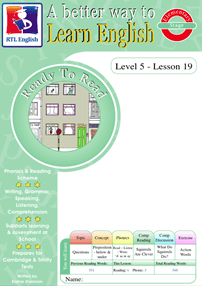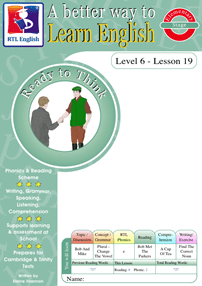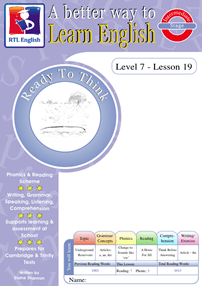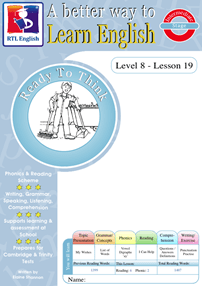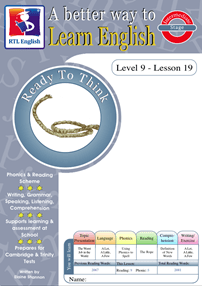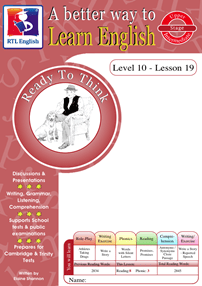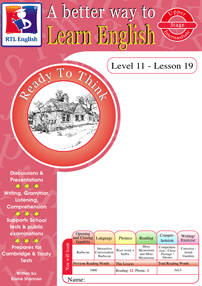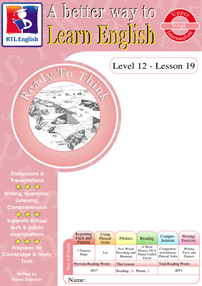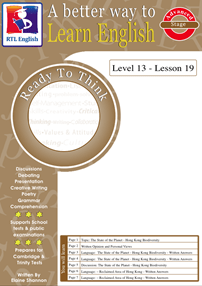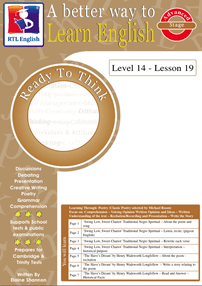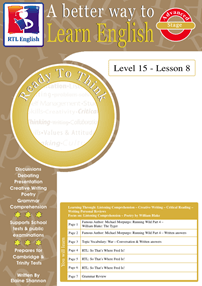English lessons for kids in Glasgow, Glasgow City

RTL English will help you teach English to your child or student in Glasgow.
RTL English enables parents, tutors & teachers to teach English to kids aged 3 to 18 years old, so that they can excel at school, in exams & beyond.
Our step-by-step, downloadable workbooks are print-ready & easy to teach. They are part of a award-winning teaching system that’s been taught millions of times, and proven over 27 years in 23 countries worldwide.
Our lesson workbooks will help your son or daughter to catch up, keep up & get ahead! Our lessons also challenge more advanced students; so whatever your child’s ability, there’s sure to be an RTL English workbook that’s suitable for them.
RTL English is a leading English language teaching company that’s recognised around the world for its award-winning & proven method of teaching English to children.
For over 20 years, RTL English has been taught in tutorial centres, homes & at schools both as part of the curriculum and as a supplementary activity. RTL English is growing in popularity worldwide, so why not join hundred of thousands of parents, tutors & teachers around the world & teach your child RTL English today?
Teaching your son or daughter to use English competently might very well be the key to his or her success at school in Glasgow City, at exams, in his or her career & beyond.
Imagine your child several months or years in the future … in Glasgow or elsewhere …
Is your child a smart child because he or she became an early reader, acquired a passion for knowledge, obtained early language & literacy skills & developed an air of confidence that will last them a lifetime?
Or is your child struggling to read, underperforming at school & set-up for a lifetime of frustration and failure?
Of course everyone wants to be the proud parent of a happy and confident son or daughter, & every parent can.
But, in order to guarantee a brighter future for your child in Glasgow City, it’s often necessary to take your son or daughter’s education into your own hands.
If you want your child to grow up to be smart & successful, then you need to understand how critical it is that you teach your child when their brain development is at its maximum.
The cerebral cortex in your child’s brain is responsible for his or her sight, hearing, & smell. It also controls his or her speech, thinking, & memory. In fact, the cerebral cortex is what makes them – them! At birth, the cells in your son or daughter’s cerebral cortex were poorly connected (they are for everyone). However, by 2 to 3 years old, the cerebral cortex contains 100 trillion connections. & that number remains high until the 8th when it starts to slowly decline and level off to adult levels (*Ref). It’s very important to take the opportunity to teach children during this time when brain development is peaking.
Teaching English to your child might be the key, not only to their success in school in Glasgow, but also their sense of self-worth, both in Glasgow City and beyond.
Elaine Shannon, Author & Curriculum Designer Tweet
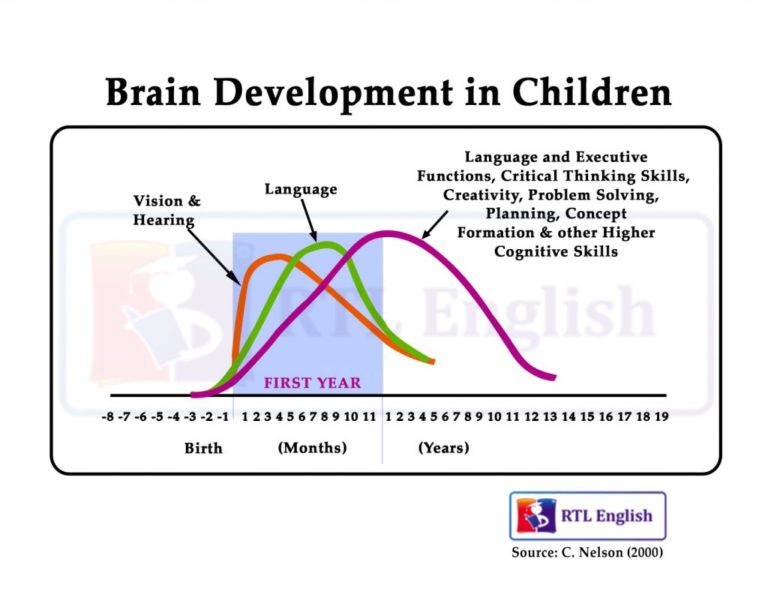
- Early & advanced English skills will make your child smarter.
- Early & advanced English skills will improve problem solving.
- Early & advanced English skills will improve planning, & abstract thinking skills.
- Early & advanced English skills will help develop complex idea comprehension.
- Early reading can help children compensate for modest levels of ability in other areas. (*Ref)
ON A PRACTICAL LEVEL, HOW IMPORTANT IS EARLY READING?
- Your child’s reading ability and vocabulary at 3 years old might predict his or her success in school in Glasgow when they are 6 to 7 years old (*Ref).
- Your son or daughter’s reading ability at 6 to 7 years old might predict his or her success at 17 to 18 years old (*Ref)!
- Your son or daughter’s reading ability at 7 to 8 years old might determine his or her graduation from senior school in Glasgow (*Ref).
ON THE OTHER HAND:
- Children who can’t read proficiently by 7 to 8 years old are four times more likely to leave school without a diploma/results than proficient readers (*Ref).
and:
- Children who are not taught Phonemic Awareness, & therefore have to rely on memory have difficulty beginning to read and continue to have difficulty with new words.
BUT, SURELY SCHOOL WILL TEACH MY CHILD TO READ? SO, WHY DO I NEED TO BOTHER?
If this is what you are thinking, then you should know that you cannot rely on schools, including those in Glasgow …
- In the USA, almost 70% of children at school who are aged 9-10 years old cannot read proficiently (*Ref)!
- And, of those children, 33% of them read at only a very basic level, and 34% are reading at a very low level (*Ref).
- It’s not very different in the UK, where over 100,000 children leave school illiterate(*Ref).
- Or in Australia, where 33% of students aged 11 years old fail to meet literacy benchmarks (*Ref).
- Or in Canada, where 42% of the entire adult population is only semi-illiterate (*Ref).
NO, YOU CANNOT RELY ON SCHOOLS.
But, why not?
- Teachers don’t always appreciate the basic building blocks of language and reading
- Teachers all too frequently don’t know how to teach English language concepts
- There just aren’t enough qualified teachers
- Classes are too over-crowded
- Kids don’t get enough one-on-one attention from teachers in the classroom
- Schools aren’t using the correct teaching systems – i.e they rely on rote learning or sight words
- Schools are overwhelmed & have tried to shift some of the burden of teaching onto apps and computers
UNFORTUNATELY, IT IS A FACT THAT:
Being illiterate is a guaranteed ticket to a dead end.
YOU NEED TO TAKE CHARGE OF YOUR CHILD’S EDUCATION – TODAY!
BUT HOW?
You can begin by teaching English to your son or daughter.
By Teaching your son or daughter to read your son or daughter will develop early reading skills that will help put them years ahead of other children in Glasgow City. So, if you’ve decided that you want to become a proud parent of a happy & smart son or daughter, then you owe it to your child to teach them to read and improve their English.
WE HELP PARENTS TEACH ENGLISH TO CHILDREN
RTL English™ offers 600 easy-to-teach & downloadable English lessons for parents to teach to their child at home. Our workbook lessons will help your child to catch up, keep up & get ahead! Our lesson workbooks also challenge more advanced students; so whatever your son or daughter’s ability, there’s sure to be an RTL English lesson that’s suitable for them.
THE RTL ENGLISH CURRICULUM CONSISTS OF FIFTEEN YEARS (LEVELS) OF TEACHING MATERIALS WHICH INCLUDE SIX HUNDRED WORKBOOKS COMPRISING 4,000 WORKSHEETS AND NINETEEN THOUSAND TEACHING INSTRUCTIONS & WILL SAVE YOU OVER TWO THOUSAND DAYS OF LESSON PREPARATION TIME!
Foundation Stage
Includes Level 1, 2 & 3.
Suitable for kids aged 3-6 years old in Glasgow, Glasgow City
Elementary Stage
Includes Level 4, 5 & 6.
Suitable for kids aged 6-9 years old in Glasgow, Glasgow City
Intermediate Stage
Includes Level 7, 8 & 9.
Suitable for kids aged 9-12 years old in Glasgow, Glasgow City
Upper Intermediate Stage
Includes Level 10, 11 & 12.
Suitable for kids aged 12-15 years old in Glasgow, Glasgow City
Advanced Stage
Incl. Level 10, 11 & 12.
Suitable for kids aged 15-18 years old in Glasgow, Glasgow City
Winning Awards Since 1996
With 24 years of research, development, dedication and experience, RTL English is committed to offering the best possible start to English language learners worldwide. RTL English is part of the Ready To Learn group, an international educational organisation with students worldwide.
Elaine Shannon founded Ready To Learn in 1996, and is an internationally respected author, language expert and School Principal with more than 40 years of specialist experience. Elaine & her team of instructional designers, linguists and educational experts developed the RTL English Curriculum.
What Happens In A Lesson?
- Each lesson is designed to last approximately 60 minutes. Normally, your child will spend 55 minutes participating in learning activities, and 5 minutes completing an achievement exercise that’s used to reinforce the lessons’ learning designs & objectives.
- Each lesson is accompanied by an RTL English lesson workbook. The workbook consists of six worksheets of instructional content and one reinforcement exercise page.
- You will use the workbook & teaching notes to guide and lead your child through the variety of learning activities in the workbook.
- Although all of our workbooks follow a similar format, each one is slightly more challenging than the last in the sequence. As a result, your child will be able to advance in small manageable steps & acquire English language skills that will last them a lifetime.
- There are 5 learning stages, 15 learning levels and 600 lessons in the RTL English curriculum.
- Your child will need to complete 36 lessons to finish one learning level – which lasts approximately 1 academic year.
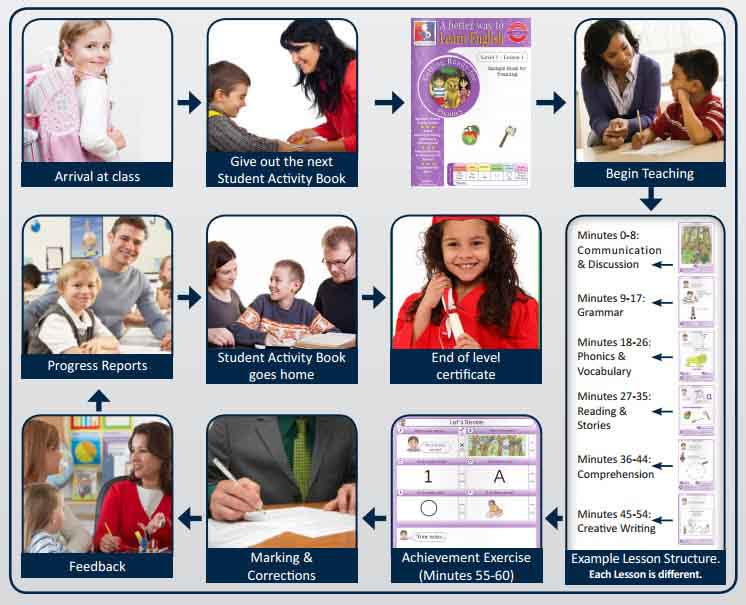
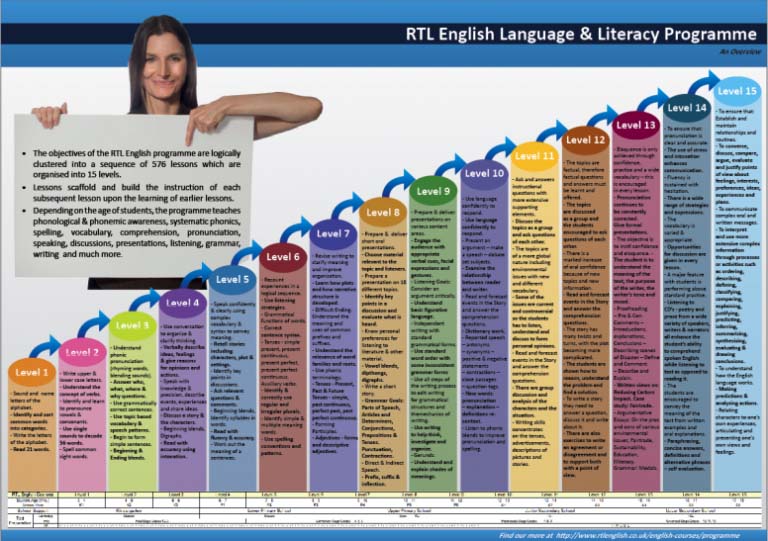
What Will My Child Be Taught?
It depends on your child’s age and their English language ability. To find out what your child will be taught, please click the grey button & then click the book cover that’s closest to your child’s current age → Lesson Workbooks
The RTL English Curriculum teaches all the communicative functions and language forms your child will need to succeed in school, exams and beyond, including:
- Phonemic Awareness
- Alphabetic Principle
- Systematic & Explicit Phonics
- Fluency with Text
- Proficient Grammar Knowledge
- Creative Writing
- Expanded Vocabulary
- Advanced Comprehension, and
- Confident Speaking Skills
The RTL English Curriculum: Kids 3 to 18 Years Old
Whatever your son or daughter’s age or English language ability, there is sure to be an RTL English course (aka ‘level’) that will help your child learn or improve his or her English. This is because our curriculum provides 15 years of learning for child aged 3 to 18 years old and teaches all the communicative functions & language forms your child will need to have a richer, more successful educational experience. RTL English will also supplement your son or daughter’s learning at their school in Glasgow.
The RTL English Curriculum consists of 15 years (levels) of teaching materials which include 600 workbooks (comprising 4,000 worksheets & 19,000 teaching notes) and saves over 2,000 days of preparation time.
Level 1
Kids: 3-4 years old
36 lessons. 36 workbooks. 252 worksheets. 1134 teaching instructions.
Level 2
Kids: 4-5 years old
36 lessons. 36 workbooks. 252 worksheets. 1134 teaching instructions.
Level 3
Kids: 5-6 years old
36 lessons. 36 workbooks. 252 worksheets. 1134 teaching instructions.
Level 4
Kids: 6-7 years old
36 lessons. 36 workbooks. 252 worksheets. 1134 teaching instructions.
Level 5
Kids: 7-8 years old
36 lessons. 36 workbooks. 252 worksheets. 1134 teaching instructions.
Level 6
Kids: 8 -9 years old
36 lessons. 36 workbooks. 252 worksheets. 1134 teaching instructions.
Level 7
Kids: 9-10 years old
36 lessons. 36 workbooks. 252 worksheets. 1134 teaching instructions.
Level 8
Kids: 10-11 years old
36 lessons. 36 workbooks. 252 worksheets. 1134 teaching instructions.
Level 9
Kids: 11-12 years old
36 lessons. 36 workbooks. 252 worksheets. 1134 teaching instructions.
Level 10
Teens: 12-13 years old
36 lessons. 36 workbooks. 252 worksheets. 1134 teaching instructions.
Level 11
Teens: 13-14 years old
36 lessons. 36 workbooks. 252 worksheets. 1134 teaching instructions.
Level 12
Teens: 14-15 years old
36 lessons. 36 workbooks. 252 worksheets. 1134 teaching instructions.
Level 13
Teens: 15-16 years old
36 lessons. 36 workbooks. 252 worksheets. 1134 teaching instructions.
Level 14
Teens: 16-17 years old
36 lessons. 36 workbooks. 252 worksheets. 1134 teaching instructions.
Level 15
Teens: 17-18 years old
8 lessons. 8 workbooks. 56 worksheets. 252 teaching instructions.
Can I See A Lesson Workbook?
There are 600 workbooks like the one below. Lesson 19, Level 1 below suits children between 3 and 4 years old. To see an example of a lesson workbook that is likely to suit your child, please click the grey button & then click the book cover that’s closest to your child’s current age → Lesson Workbooks
What Method Do You Use?
- We teach using a Step-by-Step method. The content of each lesson is determined by an 8-page workbook that’s slightly more challenging than the last in the sequence. Lessons ‘scaffold’ and build upon the learning of the previous lesson. As a result, students advance in small, manageable steps and acquire English language skills that enable them to achieve better results in school, exams & beyond..
- Sequenced instruction is organised into 5 developmentally appropriate stages, 15 levels of increasing difficulty and 600 lessons. Each lesson provides one hour of learning per week and follows a workbook that consists of six worksheets with instructional content and one reinforcement exercise page.:
- Each lesson is accompanied by a workbook follows a similar plan:
- Page 1 :: Communication/ Discussion/ Topic orientated
- Page 2 :: Grammar/ Language
- Page 3 :: Phonics/ Vocabulary
- Page 4 :: Reading (Ongoing Story)
- Page 5 :: Story Comprehension/ Language
- Page 6 :: Grammar/ Language Exercise
- Page 7 :: Achievement Exercise / Assessment
- Depending on your child’s age and their English skills, instruction will typically consist of a variety of activities including speaking, listening, letter-sound correspondence, sight words, guided oral reading, text comprehension, creative writing, grammar and critical thinking.
- You don’t need to prepare anything or create teaching materials for an RTL English lesson. It’s all been done for you. Each page of this workbook contains teaching notes to enable you to guide and lead your child through the learning activities. Once your son or daughter has finished their lesson, record their achievements in the progress report form and then simply print the next workbook in the sequence.
Will My Child Learn Phonics?
- Yes! We teach synthetic & analytical phonics which includes 44 basic phonemes, 22 beginning blends and 15 ending blends.Our students learn and practise phonics throughout our Foundation, Elementary, Intermediate and Upper Intermediate stages. Our Advanced stage uses phonics to teach pronunciation.
- We pay particular attention to blended consonant sounds (that are located at the beginning and end of many words). We teach vowels first and then consonants. As soon as possible we teach children to read. In practice this means after students have learnt 5 vowel sounds and 2 consonants they can read a few words by themselves. Children are also taught how to decode words, so from the very beginning they can see new simple words and know how to read them.
Glasgow (, also UK: /ˈɡlɑːzɡoʊ, ˈɡlɑːsɡoʊ/, ; Scots: Glesca or Glesga [ˈɡlezɡə]; Scottish Gaelic: Glaschu [ˈkl̪ˠas̪əxu]) is the most populous city in Scotland, and the third most populous city in the United Kingdom, as of the 2019 estimated city population of 611,748. Historically share of Lanarkshire, the city now forms the Glasgow City council area, one of the 32 council areas of Scotland; the local authority is Glasgow City Council. Glasgow is situated on the River Clyde in the country's West Central Lowlands. It is the fifth most visited city in the UK.
Inhabitants of the city are referred to as "Glaswegians" or, in the pejorative, as "Weegies". Glasgow is as well as known for the Glasgow patter, a determined dialect of the Scots language that is noted for being difficult to comprehend by those from uncovered the city.
Glasgow grew from a small rural settlement upon the River Clyde to become the largest seaport in Scotland, and tenth largest by tonnage in Britain. Expanding from the medieval bishopric and royal burgh, and the later introduction of the University of Glasgow in the fifteenth century, it became a major middle of the Scottish Enlightenment in the eighteenth century. From the eighteenth century onwards, the city as well as grew as one of Great Britain's main hubs of transatlantic trade with North America and the West Indies.
With the onset of the Industrial Revolution, the population and economy of Glasgow and the surrounding region expanded snappishly to become one of the world's pre-eminent centres of chemicals, textiles and engineering; most notably in the shipbuilding and marine engineering industry, which produced many open-minded and famous vessels. Glasgow was the "Second City of the British Empire" for much of the Victorian epoch and Edwardian period, having taken the mantle from pre-independence Dublin, which was largely recognised the second city during the Georgian era. Although many extra cities argue the title was theirs, not Glasgow's.
In the late 19th and to the fore 20th centuries, Glasgow's population grew rapidly, reaching a summit of 1,127,825 people in 1938. Comprehensive urban renewal projects in the 1960s resulted in large-scale relocation of people to designated new towns, such as Cumbernauld, Livingston, East Kilbride and peripheral suburbs, followed by successive boundary changes. This process condensed the population of the City of Glasgow council area to an estimated 633,120, with 985,290 people living in the defined Greater Glasgow contiguous urban area as of 2016. The wider metropolitan area is home to on top of 1,800,000 people, equating to in the region of 33% of Scotland's population. The city has one of the highest densities of any locality in Scotland at 4,023/km2.
Glasgow hosted the 2014 Commonwealth Games and the first European Championships in 2018; and is also with ease known in the sporting world for football (particularly the Old Firm rivalry between Celtic and Rangers), rugby, athletics, tennis, golf and swimming.
Today, Glasgow has a diverse architectural scene, one of the key factors leading visitors to the city. From the city middle sprawling later grand Victorian buildings, to the many glass and metal edifices in the International Financial Services District to the serpentine terraces of blonde and red sandstone in the all the rage west grow less and the imposing mansions which make happening Pollokshields, on the south side. The banks of the River Clyde are as a consequence dotted bearing in mind a plethora of futuristic-looking buildings which affix Riverside Museum, Glasgow Science Centre, the SSE Hydro and the SEC Armadillo.
Academic References
- The Cognitive Foundations of Learning to Read: A FrameWork Sebastian Wren
- The relatonship of phonemic awareness to reading acquisiton: more consequence than preconditon but still important. Wimmer H, Landerl K, Linortner R, Hummer P. University of Salzburg, Austria.
- NAEP 1998 Reading Report Card for the Nation and the States March 1999 Authors: Patricia L. Donahue, Kris n E. Voelkl, Jay R. Campbell, and John Mazzeo
- National Institute of Child Health and Human Development. (2000). Report of the National Reading Panel. Teaching children to read: An evidence-based assessment of the scientific research literature on reading and its implications for reading instruction (NIH Publica on No. 00-4769). Washington, DC: U.S. Government Prin ng Office.
- Wikipedia: http://en.wikipedia.org/wiki/Functional_illiteracy
- J Learn Disabil. 2009 Sep-Oct;42(5):392-402. Epub 2009 Jun 19. Why elementary teachers might be inadequately prepared to teach reading. Joshi RM, Binks E, Hougen M, Dahlgren ME, Ocker-Dean E, Smith DL.
- Australia Government Department of Educa on, Science and Training: htt p://www.dest.gov.au/archive/schools/literacy&numeracy/charts.html
- CBC News: Canada’s Shame – h p://www.cbc.ca/news/background/educa on/canada-shame.html
- The Timing and Quality of Early Experiences Combine to Shape Brain Architecture Center on the Developing Child, Harvard University
- Vocabulary Development and Instruc on: A Prerequisite for School Learning Andrew Biemiller, University of Toronto iii. Early reading acquisiton and its relation to reading experience and ability 10 years later. Cunningham AE, Stanovich KE.
- Double Jeopardy How Third-Grade Reading Skills and Poverty Influence High School Gradua on Donald J. Hernandez, Hunter College and the Graduate Center
- What Reading Does for the Mind ANNE E. CUNNINGHAM and KEITH E. STANOVICH

